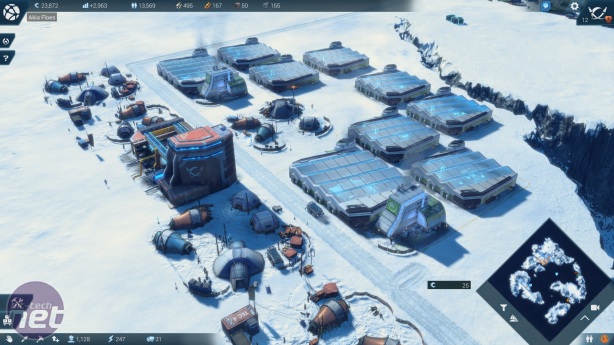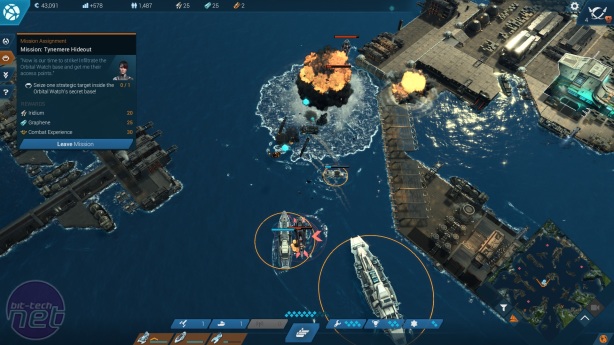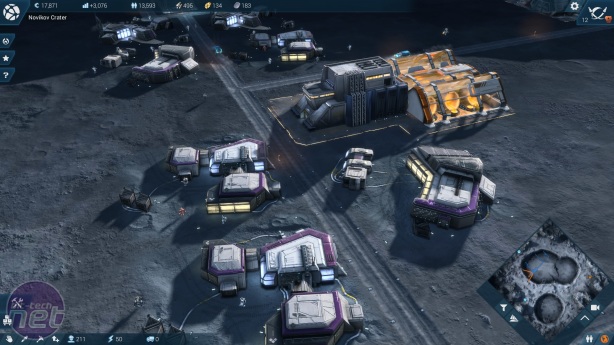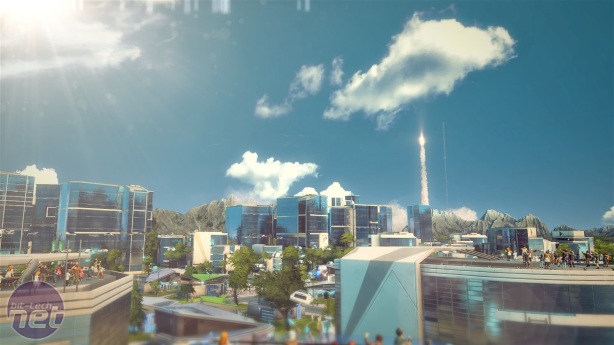
All of your cities run concurrently, expanding and outputting materials and products on a semi-autonomous basis. There is a downside to this; from time to time your economy will start to tank for no obvious reason. But with a little digging you'll usually discover that one of your cities' demand for an item has begun to exceed supply, thus lowering productivity. What's more, as you begin to build your Lunar colony, where each building and trade route is considerably more expensive, you need to return to your older cities regularly to expand and upgrade them so the profit margins are sufficient to support your Moon base.
Zipping around and tinkering with your economy is all part of the fun though, effectively communicating that feel of a high-flying executive jetting across and even beyond the globe, spinning all of their financial plates to keep them upright. It helps that the cities themselves are delightful to watch in motion. While Anno 2205's city simulation isn't as well interconnected as a game like Cities: Skylines, each individual piece is strikingly detailed. The rice-paddies that feed your workers are irrigated by tiny hovering drones, construction robots are themselves pieced together from superheated metals in complex assembly lines. Aluminium is mined from the Arctic ice by hulking mechanical spiders. Even the comparatively humdrum living areas are chock-full with flying cars and meandering pedestrians. There's a peaceful, orderly bustle about Anno 2205's depiction of the future that is oddly relaxing, despite the rather ominous undertones.
The slow piecing together of this economic puzzle is fun. But it is definitely a puzzle, and this becomes increasingly apparent as you progress. There isn't much strategy to Anno 2205. Each structure and product is chained together linearly, leaving little opportunity for creative thinking or exploring alternative business approaches. This is fine on the first play-through, but means there isn't much replay value on offer.
More problematic is what Blue Byte have focussed on instead of greater strategic variety, namely a bunch of secondary systems that are all half-baked in their execution. The most obvious of these is the combat. The game has an expensively produced but paper-thin story that sees a bunch of rebels attempting to protect the moon from colonisation by committing acts of terrorism on the encroaching corporations. Occasionally, you'll be required to embark on a combat-focussed side mission, during which you take control of a small fleet of ships and assault a fortified rebel position.
No effort is required to build this fleet; new ships unlock automatically as you progress through the game, and you start any combat mission with all available vessels. "Combat" involves clicking on enemy ships and buildings until they explode, while occasionally using a special ability like a missile strike to make them explode even harder. Visually, it's impressive enough, with exploding ships and mines causing great ripples in the crystal blue waters. But it has all the tactical nuance of a pillow fight and the depth of a puddle in the Atacama.
The same goes for the numerous side missions speckled across each map. An early Lunar example involves "rescuing" refugees dotted around the moon, which you complete by panning the camera around until you find a stranded refugee vehicle and clicking on them. It's preposterously simple. Admittedly, this particular mission has several stages to it, but each one is equally unsophisticated in terms of interaction.
Theoretically, it's possible to ignore the side-missions, unless you run low on a resource such as graphene, which is primarily acquired through completing these secondary activities. In practice, though, it's almost impossible to ignore the side missions because the game never stops mithering you about them. Every minute or so, one of your multiple advisors or trade liaisons will pop-up on screen like an Internet advert, imploring you to step away from the complex and involving main game to faff about for five minutes on some tedious errand. This isn't the first time a Ubisoft game has done this, but I sincerely hope it's the last, because having a game pester you about the bits of it you haven't played yet is one of the most off-putting things I've experienced in this job.
There are a few other annoyances too. Anno 2205 has no multiplayer, and yet the game requires a constant Internet connection to play it. Allegedly, this is because the prices of goods fluctuate on the game's virtual stock market depending on what other players buy and sell. But to me this hardly seems crucial to enjoyment, and more like an excuse to justify a constant Internet connection. Also, at almost £50 on Steam, Anno 2205 is eye-wateringly expensive, especially when you consider that Cities: Skylines, a game that is in my opinion superior to Anno, is less than half the price.
All considered, Anno 2205 is a decent city-builder, with meticulous attention to detail on its buildings and a unique and involving trading network. But it would be a much better creation if Blue Byte had dispensed with the inconsequential secondary fluff that orbits the core game, and instead concentrated that effort on giving the player greater variety within the tech-tree.
Zipping around and tinkering with your economy is all part of the fun though, effectively communicating that feel of a high-flying executive jetting across and even beyond the globe, spinning all of their financial plates to keep them upright. It helps that the cities themselves are delightful to watch in motion. While Anno 2205's city simulation isn't as well interconnected as a game like Cities: Skylines, each individual piece is strikingly detailed. The rice-paddies that feed your workers are irrigated by tiny hovering drones, construction robots are themselves pieced together from superheated metals in complex assembly lines. Aluminium is mined from the Arctic ice by hulking mechanical spiders. Even the comparatively humdrum living areas are chock-full with flying cars and meandering pedestrians. There's a peaceful, orderly bustle about Anno 2205's depiction of the future that is oddly relaxing, despite the rather ominous undertones.
The slow piecing together of this economic puzzle is fun. But it is definitely a puzzle, and this becomes increasingly apparent as you progress. There isn't much strategy to Anno 2205. Each structure and product is chained together linearly, leaving little opportunity for creative thinking or exploring alternative business approaches. This is fine on the first play-through, but means there isn't much replay value on offer.
More problematic is what Blue Byte have focussed on instead of greater strategic variety, namely a bunch of secondary systems that are all half-baked in their execution. The most obvious of these is the combat. The game has an expensively produced but paper-thin story that sees a bunch of rebels attempting to protect the moon from colonisation by committing acts of terrorism on the encroaching corporations. Occasionally, you'll be required to embark on a combat-focussed side mission, during which you take control of a small fleet of ships and assault a fortified rebel position.
No effort is required to build this fleet; new ships unlock automatically as you progress through the game, and you start any combat mission with all available vessels. "Combat" involves clicking on enemy ships and buildings until they explode, while occasionally using a special ability like a missile strike to make them explode even harder. Visually, it's impressive enough, with exploding ships and mines causing great ripples in the crystal blue waters. But it has all the tactical nuance of a pillow fight and the depth of a puddle in the Atacama.
The same goes for the numerous side missions speckled across each map. An early Lunar example involves "rescuing" refugees dotted around the moon, which you complete by panning the camera around until you find a stranded refugee vehicle and clicking on them. It's preposterously simple. Admittedly, this particular mission has several stages to it, but each one is equally unsophisticated in terms of interaction.
Theoretically, it's possible to ignore the side-missions, unless you run low on a resource such as graphene, which is primarily acquired through completing these secondary activities. In practice, though, it's almost impossible to ignore the side missions because the game never stops mithering you about them. Every minute or so, one of your multiple advisors or trade liaisons will pop-up on screen like an Internet advert, imploring you to step away from the complex and involving main game to faff about for five minutes on some tedious errand. This isn't the first time a Ubisoft game has done this, but I sincerely hope it's the last, because having a game pester you about the bits of it you haven't played yet is one of the most off-putting things I've experienced in this job.
There are a few other annoyances too. Anno 2205 has no multiplayer, and yet the game requires a constant Internet connection to play it. Allegedly, this is because the prices of goods fluctuate on the game's virtual stock market depending on what other players buy and sell. But to me this hardly seems crucial to enjoyment, and more like an excuse to justify a constant Internet connection. Also, at almost £50 on Steam, Anno 2205 is eye-wateringly expensive, especially when you consider that Cities: Skylines, a game that is in my opinion superior to Anno, is less than half the price.
All considered, Anno 2205 is a decent city-builder, with meticulous attention to detail on its buildings and a unique and involving trading network. But it would be a much better creation if Blue Byte had dispensed with the inconsequential secondary fluff that orbits the core game, and instead concentrated that effort on giving the player greater variety within the tech-tree.
-
Overall70 / 100


MSI MPG Velox 100R Chassis Review
October 14 2021 | 15:04













Want to comment? Please log in.